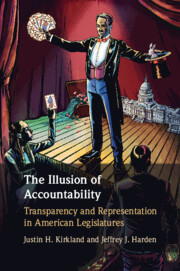Book contents
- Frontmatter
- Dedication
- Contents
- List of Figures
- List of Tables
- Acknowledgements
- Prologue
- 1 Sunshine in the Statehouse
- Part I Transparency and State Legislatures
- Part II Transparency and The Mass Public
- 6 Public Demand
- 7 Attitudinal Consequences
- 8 The Electoral Connection
- 9 Does Democracy Require Transparency?
- References
- Index
7 - Attitudinal Consequences
from Part II - Transparency and The Mass Public
Published online by Cambridge University Press: 11 August 2022
- Frontmatter
- Dedication
- Contents
- List of Figures
- List of Tables
- Acknowledgements
- Prologue
- 1 Sunshine in the Statehouse
- Part I Transparency and State Legislatures
- Part II Transparency and The Mass Public
- 6 Public Demand
- 7 Attitudinal Consequences
- 8 The Electoral Connection
- 9 Does Democracy Require Transparency?
- References
- Index
Summary
Next, Chapter 7 extends our analysis of the public’s response to open deliberation within legislatures using standard survey questions from the CES. We begin by showing that citizens in states with open meetings laws are more likely to respond to a state legislative political knowledge question with a “don’t know” response. Additionally, those in open meetings states who provide a substantive response are less likely to know the correct answer compared to citizens in states with closed meetings who answer substantively. We then demonstrate that among those who identify with the party controlling the legislature, open meetings are associated with an increase in state legislative approval. Thus, this chapter (and the previous one) paint a picture of a public in transparency states that approves of its legislature, but does not actually know more about it. The key information link that represents the mechanism of our proposed theory is missing. This finding helps explain why representative behavior does not change in the wake of transparency reforms; the public does not engage with new information provided by these reforms enough to motivate adaptation by legislators.
- Type
- Chapter
- Information
- The Illusion of AccountabilityTransparency and Representation in American Legislatures, pp. 196 - 217Publisher: Cambridge University PressPrint publication year: 2022



